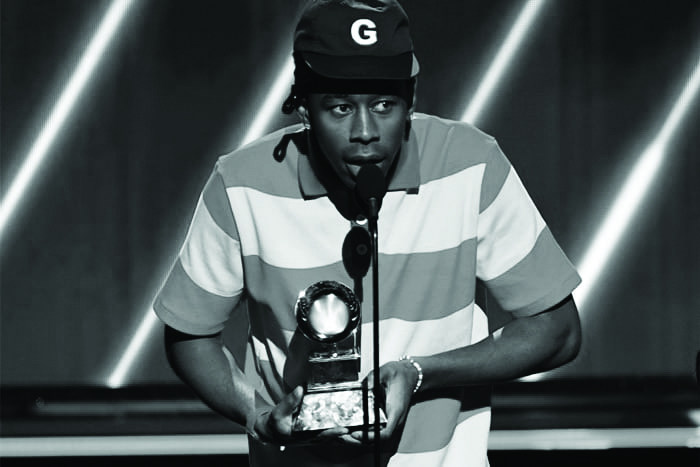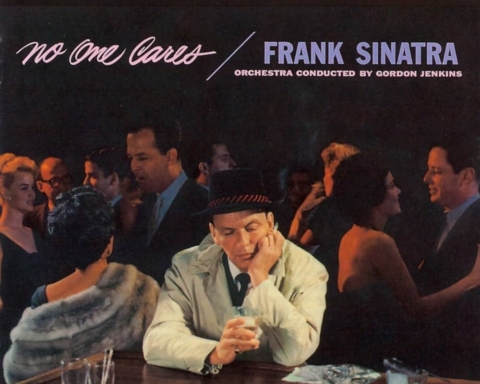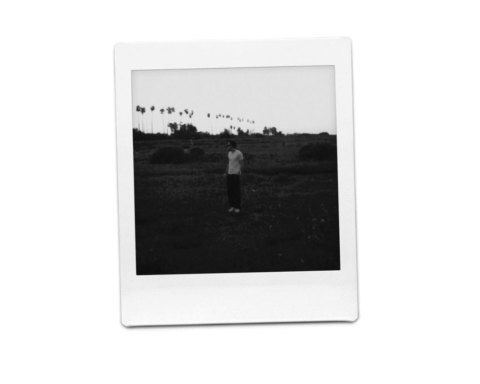By Tucker Reilly, News Assignment Editor
Last Sunday, at the Staples Center in Los Angeles, California, Tyler, the Creator took home his first Grammy. Although Tyler had been nominated twice before, in 2012 and 2017, it was his “Igor” project, released in May 2019, which brought him the award for Best Rap Album. In an interview backstage, however, he reflected on the mix of emotions he felt upon receiving the award.
“On one side, I’m very grateful that what I made could just be acknowledged in a world like this,” the artist said. “It sucks that whenever we, and I mean guys that look like me, do anything that’s genre-bending, they always put it in a ‘rap’ or ‘urban’ category.”
With the Grammy Awards past, and the album nearly a year old, the time has come to re-examine “Igor”, not as a rap project, but as the genre-defying tour-de-force it is.
Tyler, the Creator’s “Igor” is an electric fever dream which seems to rebel against the aesthetic of the artist’s prior works to create something entirely new.
The opening track, “IGOR’S THEME,” sets the scene for “Igor,” with a spacey, humming synth chord that penetrates the ear. The chord slowly builds into a washed-out chorus of “ride around town, they gon’ feel this one,” led by Lil Uzi Vert, and accompanied by a wave of electronic flows and hums. Closing out with a slower piano riff, the introduction immediately transitions into “EARFQUAKE,” a piano-led ballad in which a shrill-voiced Tyler begs someone to stay with him. The song becomes more desperate as it goes on, with Tyler crying out, “don’t leave, it’s my fault” under spinning instrumentals.
“I THINK” brings a softer sound to the album, with a rubbery drum baseline, gentle synth keyboard and slight crackling effect quite similar to a campfire. Tyler experiences falling in love but ponders how he can tell the subject of his affection, while singer Solange plays backup to his discoveries.
“RUNNING OUT OF TIME” contains minimal instrumental accompaniment, utilizing simple bass movements and acting as a slow lament for Tyler’s untaken actions. The song acts as a gateway into the aggressive “NEW MAGIC WAND,” where simple cycling riffs become harsh synth drones, and Tyler contemplates taking extreme actions to keep hold of a relationship. The track contains some rapping, filtered heavily with auditory effects that alternatingly blow out speakers and deliver high-pitched flows. The presence of Tyler’s erratic laughter and the lighter “please don’t leave me” murmurs give the track a full sound, one which becomes terrifying on repeat to listen. This effect is once again suddenly countered by the slower “A BOY IS A GUN,” in which Tyler bemoans his ill-treatment at the hands of his lover, and finally realizes that they can no longer be together. The track exhibits a more traditional “Tyler sound,” with unaltered and raspy vocals over a much slower piano instrumental, only interrupted by gunshots.
“PUPPET” contains one of the most straightforward features on “Igor.” Kanye West, representing a sympathetic force in Tyler’s life, comes in to comfort him as Tyler describes being someone’s “puppet.” Continuing the slow pace and light instrumentals found on “A BOY IS A GUN,” “PUPPET” is the lowest point of the album, as Tyler surrenders to the sensation of being controlled. The song acts as a buildup to the blaring “WHAT’S GOOD,” an openly confrontational explosion of nervous energy where Tyler’s alter-ego runs rampant, with lines like, “If the cop says my name b**** I’m Igor.” The song transitions with a realization of “I see the light,” and a hard bass flare, after which Tyler drops into a monstrous-sounding monotone incantation. The effect hits hard and is one of the most hair-raising moments of the album.
The final three songs seem to blend into each other, their softer sound contrasting heavily with the previous track. “GONE, GONE / THANK YOU” is a light, soul-infused song with high-pitched singing over a simple synth rush. It’s euphoric, and the incorporation of a traditional Tyler rap section and transition into “thank you” reinforce this feeling. Tyler has escaped the relationship he had previously surrendered to, and yet there is a part of him that is still grateful. The muted vocals on “I DON’T LOVE YOU ANYMORE” express a long-repressed realization for Tyler, and the lingering clear tone that closes the track contrasts sharply with the fuzzy blasts on earlier tracks like “NEW MAGIC WAND.”
As the album closes, “ARE WE STILL FRIENDS” produces a sound not yet heard on the album: a smooth, honey-sweet melody with largely unaltered singing from Tyler. After the heavy-electronic distortion present on the rest of the project, “ARE WE STILL FRIENDS” gives the sensation of a sky clearing after a storm. With a final primal scream, “Igor” ends, and Tyler’s journey is complete.
At first glance, “Igor” seems to depart entirely from the sound incorporated in previous Tyler, the Creator albums. The amount of vocal effects present mask the usually iconic growl of most projects, the electronic backing sounds foreign to longtime fans and there isn’t much rapping to be found on the project. In reality, elements of previous albums are present throughout “Igor,” from the “wall of sound” qualities and rough tones of Goblin and Cherry Bomb to the quietly moody melodies of “Flower Boy”, Tyler refines and revises tried and true aesthetics, while also subverting them into a completely new and sometimes unrecognizable form.
“Igor” isn’t a rap album, more clearly adhering to a “neo-soul” or “electronica” or even “pop.” Regardless, it’s a beautiful mess of a project, one which combines incredible musical skill with a compelling narrative to create something irreplaceable.
reillyt19@bonaventure.edu








